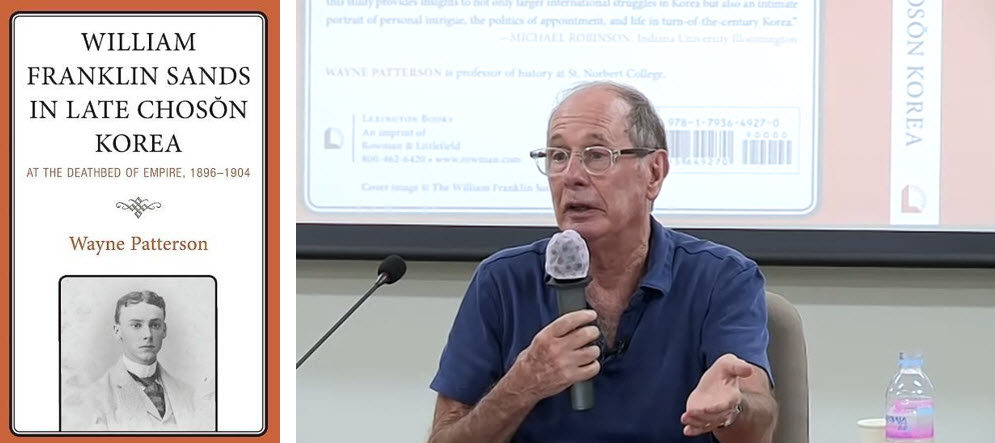On July 14, The International Center for Korean Studies (ICKS) of the Kyujanggak Institute for Korean Studies at SNU hosted the fifth installment of its 2023 book talk series, introducing books by international scholars specializing in Korean studies. The previous four lectures featured works that cover a wide array of topics, ranging from the invention of the Korean alphabet and its social implications to the intertwining of language, truth, and power in North Korea. With the fresh lens offered by international scholars, these talks aim to facilitate the exchange of novel perspectives on Korean history and culture. The most recent talk was led by Professor Wayne Patterson (University of Pennsylvania), who introduced his book William Franklin Sands in Late Choson Korea: At the Deathbed of Empire, 1896-1904.

Professor Wayne Patterson introducing William Franklin Sands in Late Choson Korea
During the waning years of the Choson Dynasty, William Franklin Sands was the highest-ranking foreign advisor to the Korean government. Though not a prominent name in history, Sands, in fact, had great influence, which allowed him direct access to Emperor Kojong. He hoped to advise the emperor on implementing reforms and promoting Korean neutrality on the international stage. Amid the tumultuous political landscape, however, Sands was ultimately largely unsuccessful in his endeavors, and Korea eventually succumbed to Japanese rule. Undiplomatic Memories was the advisor’s detailed and undisputed record of his time and efforts in the peninsula.
Professor Patterson found inspiration for his book through Sands’ Papers at St. Charles Borromeo Seminary in Pennsylvania. Examining the original transcripts, he realized that there were several discrepancies between those and Sands’ official accounts in Undiplomatic Memories. Supplementing his research with other papers and newspaper articles published in Korea at the time, Professor Patterson began to piece together a more elaborate, unsanitized, and nuanced picture of Sands’ experiences and the state of politics in Korea at the turn of the 20th century. William Franklin Sands in Late Choson Korea: At the Deathbed of Empire, 1896-1904 is a product of Professor Patterson’s extensive research and construction of this more complete and comprehensive picture.
During the discussion session that followed, the two guest discussants Professors Cheolbae Son (Emeritus, Yonsei University) and Michael Kim (Yonsei University) shared their thoughts on Professor Patterson’s book. Professor Son praised the book as “an especially welcome addition to the growing body of study on Western expatriates in Korea” that “provides very interesting, revealing, and refreshing perspectives unavailable in Korean sources.” Despite only being in his twenties, Sands’ unique position in the government hierarchy made an analysis of his private and public affairs with friends, parents, colleagues, and other advisors particularly riveting. Professor Son concluded with the remark that William Franklin Sands in Late Choson Korea: At the Deathbed of Empire, 1896-1904 is a “masterful portrayal” of Sands and his perspectives on the final years of the dynasty. Professor Kim also pointed out the importance of the narrative approach taken in Professor Patterson’s book. While acknowledging that history is significantly defined by the actions taken by great powers, he stressed that individuals also have “an extraordinary impact on these events.” Yet, regrettably, few books offer “detailed studies of who these actors, such as Sands, were, and what they did.” Professor Kim concluded that this specific “micro-level” analysis of history is not only an accomplishment on its own but is a stellar example of an approach to deriving fresh perspectives on different historical periods beyond the Choson Dynasty.
Written by Hee Seo Lee, SNU English Editor, heeseolee@snu.ac.kr
Reviewed by Professor Jiewuh Song, Department of Political Science and International Relations, jiewuh@snu.ac.kr

